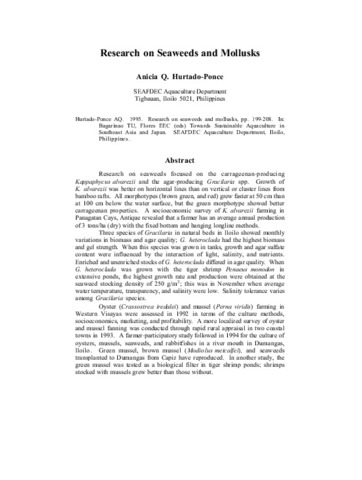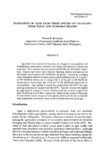Research on seaweeds and mollusks
- Global styles
- MLA
- Vancouver
- Elsevier - Harvard
- APA
- Help

Date
1995Author
Page views
7,807ASFA keyword
agar 
stocking density
mussel culture
carrageenins
environmental factors
chromosomes
socioeconomic aspects
research
seaweeds
marine crustaceans
aquaculture techniques
growth rate
seed (aquaculture)
biofilters
transplantation
shellfish culture
extensive aquaculture
stock assessment
pond culture
mollusc culture
polyculture (aquaculture)
oyster culture
seed production
spawning
aquaculture economics
culture tanks
cage culture
marine molluscs
mariculture
seaweed culture

stocking density

mussel culture

carrageenins

environmental factors

chromosomes

socioeconomic aspects

research

seaweeds

marine crustaceans

aquaculture techniques

growth rate

seed (aquaculture)

biofilters

transplantation

shellfish culture

extensive aquaculture

stock assessment

pond culture

mollusc culture

polyculture (aquaculture)

oyster culture

seed production

spawning

aquaculture economics

culture tanks

cage culture

marine molluscs

mariculture

seaweed culture

AGROVOC keyword
Penaeus monodon 
Haliotis
Decapoda
Perna viridis
Mollusca
Modiolus metcalfei
Placuna placenta
Kappaphycus alvarezii
Haliotis asinina
Gracilaria heteroclada
Gracilaria
Crassostrea iredalei
Giant tiger prawn
Philippines, Western Visayas
Philippines, Panay I., Antique, Caluya, Panagatan Cays
South East Asia
Philippines, Panay I., Antique
Philippines, Panay I., Iloilo, Dumangas

Haliotis

Decapoda

Perna viridis

Mollusca

Modiolus metcalfei

Placuna placenta

Kappaphycus alvarezii

Haliotis asinina

Gracilaria heteroclada
Gracilaria

Crassostrea iredalei

Giant tiger prawn
Philippines, Western Visayas
Philippines, Panay I., Antique, Caluya, Panagatan Cays
South East Asia

Philippines, Panay I., Antique
Philippines, Panay I., Iloilo, Dumangas
Taxonomic term
Metadata
Show full item record
Share
Abstract
Research on seaweeds focused on the carrageenan-producing Kappaphycus alvarezii and the agar-producing Gracilaria spp. Growth of K. alvarezii was better on horizontal lines than on vertical or cluster lines from bamboo rafts. All morphotypes (brown green, and red) grew faster at 50 cm than at 100 cm below the water surface, but the green morphotype showed better carrageenan properties. A socioeconomic survey of K. alvarezii farming in Panagatan Cays, Antique revealed that a farmer has an average annual production of 3 tons/ha (dry) with the fixed bottom and hanging longline methods.
Three species of Gracilaria in natural beds in lloilo showed monthly variations in biomass and agar quality; G. heteroclada had the highest biomass and gel strength. When this species was grown in tanks, growth and agar sulfate content were influenced by the interaction of light, salinity, and nutrients. Enriched and unenriched stocks of G. heteroclada differed in agar quality. When G. heteroclada was grown with the tiger shrimp Penaeus monodon in extensive ponds, the highest growth rate and production were obtained at the seaweed stocking density of 250 g/m2; this was in November when average water temperature, transparency, and salinity were low. Salinity tolerance varies among Gracilaria species.Oyster (Crassostrea iredalei) and mussel (Perna viridis) farming in Western Visayas were assessed in 1992 in terms of the culture methods, socioeconomics, marketing, and profitability. A more localized survey of oyster and mussel fanning was conducted through rapid rural appraisal in two coastal towns in 1993. A farmer-participatory study followed in 1994 for the culture of oysters, mussels, seaweeds, and rabbitfishes in a river mouth in Dumangas, lloilo. Green mussel, brown mussel (Modiolus metcalfei), and seaweeds transplanted to Dumangas from Capiz have reproduced. In another study, the green mussel was tested as a biological filter in tiger shrimp ponds; shrimps stocked with mussels grew better than those without.
A nationwide survey on the Placuna placenta fishery in 1993 showed 27 remaining 'kapis' beds; many others have been depleted due to excessive gathering, pollution, siltation, and trawling. Broodstocks are being developed to produce 'kapis' seed for grow-out and restocking. For the first time at AQD, adult donkey-ear abalone Haliotis asinina from the wild spawned naturally in laboratory tanks.
Juvenile abalones can be successfully grown on Gracilaria or abalone diet.
Suggested Citation
Hurtado-Ponce, A. Q. (1995). Research on seaweeds and mollusks. In T. U. Bagarinao & E. E. C. Flores (Eds.), Towards Sustainable Aquaculture in Southeast Asia and Japan: Proceedings of the Seminar-Workshop on Aquaculture Development in Southeast Asia, Iloilo City, Philippines, 26-28 July, 1994 (pp. 199-208). Tigbauan, Iloilo, Philippines: Aquaculture Department, Southeast Asian Fisheries Development Center.
Type
Conference paperISBN
971851127XCollections
- ADSEA '94 [21]
Related items
Showing items related by title, author, creator and subject.
-
Gracilaria (Rhodophyta) farming in Panay, Western Visayas, Philippines
Hurtado-Ponce, Anicia Q.; Samonte, Giselle P. B.; Luhan, Maria Rovilla J.; Guanzon, Nicholas G., Jr. (Elsevier, 1992)Interviews were conducted among eight Gracilaria growers in Panay, Western Visayas, Philippines from March to July (1990) using a structured questionnaire. The "rice planting" method was employed by farmers growing seaweeds ... -
Evaluation of agar from three species of Gracilaria from Panay and Guimaras islands
de Castro, Teresa R. (San Carlos Publications, University of San Carlos, 1993)Agar from three species of Gracilaria, G. changii G. coronopifolia, and Gracilariopsis heteroclada, collected form Panay and Guimaras islands was evaluated. Each species was pretreated with NaOH solution before extraction. ... -
Mangroves and shrimp pond culture effluents in Aklan, Panay Is., central Philippines
Primavera, Jurgenne ; Altamirano, Jon; Lebata, M. J. H. L.
; Altamirano, Jon; Lebata, M. J. H. L.  ; delos Reyes, Aurelio A., Jr.; Pitogo, C. L. (University of Miami, Rosenstiel School of Marine and Atmospheric Science, 2007)
The capacity of a natural mangrove system in Ibajay, Aklan province, central Philippines to process shrimp pond culture effluents was assessed through analysis of mangrove community structure and 24-hr monitoring of water ...
; delos Reyes, Aurelio A., Jr.; Pitogo, C. L. (University of Miami, Rosenstiel School of Marine and Atmospheric Science, 2007)
The capacity of a natural mangrove system in Ibajay, Aklan province, central Philippines to process shrimp pond culture effluents was assessed through analysis of mangrove community structure and 24-hr monitoring of water ...





